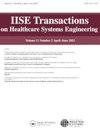Impact of cognitive workload and situation awareness on clinicians’ willingness to use an artificial intelligence system in clinical practice
IF 1.5
Q3 HEALTH CARE SCIENCES & SERVICES
IISE Transactions on Healthcare Systems Engineering
Pub Date : 2022-09-22
DOI:10.1080/24725579.2022.2127035
引用次数: 2
Abstract
Abstract Determinants of technology acceptance are multifaceted, particularly for artificial intelligence (AI) in healthcare. Using AI might impact users’ cognitive workload and situation awareness. This study explores the moderating effect of clinicians’ situation awareness and workload on the interaction between trust, risk, and intent to use an AI-based decision support system known as the blood utilization calculator (BUC). The study took place at an academic hospital in Wisconsin, US. A purposeful sampling strategy was utilized to recruit 119 BUC users. The data was collected via an online validated survey. The study leveraged Hayes PROCESS to capture the moderation effect of situation awareness and cognitive workload on the relationship between perceived risk and trust. The study also reports the significant impact of situation awareness (positively) and cognitive workload (negatively) on intent to use BUC. Adding to the body of knowledge, our study advocates for minimal cognitive workload and optimal situation awareness in healthcare.认知工作量和情境意识对临床医生在临床实践中使用人工智能系统意愿的影响
摘要技术接受度的决定因素是多方面的,尤其是医疗保健领域的人工智能。使用人工智能可能会影响用户的认知工作量和情境意识。本研究探讨了临床医生的情境意识和工作量对信任、风险和使用基于人工智能的决策支持系统(即血液利用计算器(BUC))意图之间的相互作用的调节作用。这项研究在美国威斯康星州的一家学术医院进行。采用有目的的抽样策略招募了119名BUC用户。数据是通过在线验证调查收集的。该研究利用Hayes过程来捕捉情境意识和认知工作量对感知风险和信任之间关系的调节作用。该研究还报告了情境意识(积极)和认知工作量(消极)对使用BUC意图的显著影响。除此之外,我们的研究还提倡在医疗保健中尽可能减少认知工作量和实现最佳情境意识。
本文章由计算机程序翻译,如有差异,请以英文原文为准。
求助全文
约1分钟内获得全文
求助全文
来源期刊

IISE Transactions on Healthcare Systems Engineering
Social Sciences-Safety Research
CiteScore
3.10
自引率
0.00%
发文量
19
期刊介绍:
IISE Transactions on Healthcare Systems Engineering aims to foster the healthcare systems community by publishing high quality papers that have a strong methodological focus and direct applicability to healthcare systems. Published quarterly, the journal supports research that explores: · Healthcare Operations Management · Medical Decision Making · Socio-Technical Systems Analysis related to healthcare · Quality Engineering · Healthcare Informatics · Healthcare Policy We are looking forward to accepting submissions that document the development and use of industrial and systems engineering tools and techniques including: · Healthcare operations research · Healthcare statistics · Healthcare information systems · Healthcare work measurement · Human factors/ergonomics applied to healthcare systems Research that explores the integration of these tools and techniques with those from other engineering and medical disciplines are also featured. We encourage the submission of clinical notes, or practice notes, to show the impact of contributions that will be published. We also encourage authors to collect an impact statement from their clinical partners to show the impact of research in the clinical practices.
 求助内容:
求助内容: 应助结果提醒方式:
应助结果提醒方式:


